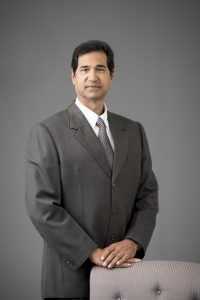
The Honourable Mr. Justice Peter Jamadar was sworn in as a Judge of the Caribbean Court of Justice on July 4, 2019 and formally assumed duties on July 15, 2019. He obtained his Bachelor of Laws degree (Hons) from The University of the West Indies (The UWI) in 1982 and his Legal Education Certificate (LEC) from the Hugh Wooding Law School, St. Augustine, Trinidad in 1984. In 1984, he was admitted to the Bar of the Republic of Trinidad and Tobago. On September 15, 1997, he was appointed a Puisne Judge of the High Court, and on October 1, 2008, he was elevated to the Court of Appeal of Trinidad and Tobago.
From 1984 to 1991, before his service to the Judiciary of Trinidad and Tobago, Mr Justice Jamadar was in private practice as an attorney-at-law in the Chambers of his father, Vernon Jamadar and a partner in the firm, Jamadar and Kangaloo from 1991 to 1994. From 1994 to 1997, Justice Jamadar attended the University of Toronto, Canada, and obtained the degree of Master of Divinity (First Class Honours). He is a former President of the Assembly of Southern Lawyers and an executive member of the Trinidad and Tobago Law Association.
Mr Justice Jamadar is deeply involved in judicial education and training nationally, regionally, and internationally. In June 2004, Justice Jamadar completed the Commonwealth Judicial Education Institute’s (CJEI) Intensive Study Programme for Judicial Educators and subsequently became a Fellow of the CJEI. He is now Vice President (Programming) and a faculty member of the CJEI. He also holds a Certificate in Training Judicial Trainers from the University College London Judicial Institute (2015). He served as a director on the Board of the Judicial Education Institute of Trinidad and Tobago (JEITT) from 2002-2009 and in 2009, he was appointed Chairman of the JEITT. He functioned in this role until 2019. Justice Jamadar is the current Chairman of the Caribbean Association of Judicial Officers (CAJO), an incorporated non-profit regional association that facilitates evidence-based judicial training and education. Since being elected as Chairman in 2019, he has served on several CAJO sub-committees.
With a love for research, he has spearheaded Caribbean-based research in several emerging areas, such as Procedural Fairness in the Courts of Trinidad and Tobago, Exploring the Well-being of Caribbean Judicial Officers, and Caribbean research on Mindfulness as Intentional Awarenessing, as an aid to judicial integrity and performance. Regionally and through CAJO, he led the research, development, and publication in 2023 of a Criminal Bench Book for Barbados, Belize, and Guyana, and disability and inclusion awareness guidelines for judiciaries and judicial Officers. In 2022, through CAJO, he also led a Joint Caribbean Centric Jurisprudence Research Project to determine the extent to which English and other non-Caribbean texts, judgments and other teaching aids as opposed to Caribbean texts, judgments and other course materials, are referred to in the teaching-learning process at the Faculty of Law, The University of the West Indies. He is also involved with the United Nations Global Integrity Network and assisted in developing a Global Social Media Protocol for judicial officers. He works with other international organisations such as Global Affairs Canada and UN Women on Caribbean justice sector reform initiatives.
Mr Justice Jamadar is a published author, having written two books on democratic reform: “The Mechanics of Democracy” (1989) and “Democracy & Constitution Reform in Trinidad and Tobago” with Dr. Kirk Meighoo (2008). He has authored through the Foundation for Human Development “Glimpses” (2016) and “Insights” (2023). He has also written numerous articles and authored various legal publications, including: “Women and the Law“, in Why Not a Woman? 1993, Paria Publishing Co. Ltd; “Sabbatical Leave for Judicial Officers, the Case for, in Trinidad and Tobago“, West Indian Law Journal, Vol. 33, May & October, 2008, Nos. 1 & 2; “Art and Techniques of Adjudicating, Uncovering the Artistry of Adjudication“, West Indian Law Journal, Vol. 35, May, 2010, No. 1; “Access to Justice, Pathway to Peace: Constructing Sustainable Civilizations“, CJEI Report, Newsletter of the Commonwealth Judicial Education Institute, Winter 2010; “The Triumphs and Trials of Judicial Education in a Small Jurisdiction“, IOJT Journal, Issue 5, 2016 (with Kent Jardine, Judicial Educator, JEITT); “Securing Equality for All“, (with Dr. Dylan Kerrigan, Elron Elahie and Torri Sinanan) 2017, Judicial Dialogue, Port-of-Spain, Trinidad; “The Role of the CPR Judge“, (with Kamla Jo Braithwaite) 2017, JEITT/Paria Publishing Co. Ltd.; “Proceeding Fairly: Report on the extent to which elements of Procedural Fairness exist in the court systems of the Judiciary of the Republic of Trinidad and Tobago“, (with Elron Elahie) 2018, JEITT/Paria Publishing Co. Ltd.; and “Procedural Fairness A Manual: A guide to the implementation of Procedural Fairness in the court systems of the Judiciary of the Republic of Trinidad and Tobago“, (with the JEITT Publications and Research team) 2018, JEITT/Paria Publishing Co. Ltd.
Mr Justice Jamadar served on several committees while at the Judiciary of Trinidad and Tobago, including the Rules Committee of the Supreme Court (2002-2019), the Bench Bar Committee (2008-2019), and the Judicial Research Counsel Management Committee (2010-2019). He has led the development and rollout of a Gender Protocol for the Judiciary of Trinidad and Tobago (2018) and throughout the Caribbean.
Currently, at the CCJ, Mr Justice Jamadar, serves on several CCJ court-appointed committees, including the Harassment Policy Sensitization Committee, the Monitoring and Evaluation Committee, and the Education and Training Committee. He remains committed to research and evidence-based developmental initiatives in the law and justice sectors and is passionate about the indigenous advancement of Caribbean jurisprudence.
In May 2023, Mr Justice Jamadar received an honorary doctorate (DD) from Emmanuel College of Victoria University, University of Toronto, Canada, for his Caribbean and international contributions to the transformation of people and society in the areas of law and divinity.
